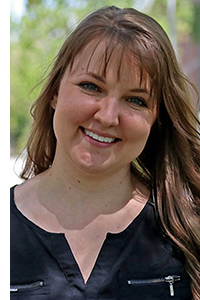 Robert Wilson performs a leg extension at the St. Denis Centre as part of the Adapted Physical Exercise (APEX) program coordinated by PhD student Kelly Carr in partnership with Community Living Essex County.
Robert Wilson performs a leg extension at the St. Denis Centre as part of the Adapted Physical Exercise (APEX) program coordinated by PhD student Kelly Carr in partnership with Community Living Essex County.
Kelly Carr wants to destroy barriers.
That’s why her research as a PhD student at the University of Windsor has worked to showcase the strengths of people with disabilities to combat the negative stigma that often follows them throughout their lives.
Carr’s research is broken into three phases and examines how people with an intellectual disability or autism spectrum disorder (ASD) participating in a physical exercise program, meaningful employment and elite sports can influence opinion.
“Showcasing the strengths in people with disabilities can change social perceptions of what disability is,” said the human kinetics grad student.
 Carr coordinated an Adapted Physical Exercise (APEX) program with Community Living Essex County that took 15 participants and provided them with 12 weeks of full-body exercise training at the St. Denis Centre.
Carr coordinated an Adapted Physical Exercise (APEX) program with Community Living Essex County that took 15 participants and provided them with 12 weeks of full-body exercise training at the St. Denis Centre.
Carr, with the help of 23 HK undergraduate volunteers and instructors Sean Horton, Nadia Azar and Chad Sutherland, trained with the participants to work on strength training, cardiovascular exercises and flexibility.
“A lot of people have the perceptions that they won’t be able to complete the exercise, they won’t want to go to the gym because it’s too loud or they’ll be too distracted,” Carr said.
“We have never come across that, and nearly everyone who has started has finished the program.”
But Carr said her primary interest lay in the perceptions of those working with and working out with the people with ASD and intellectual disabilities.
“I interviewed a good handful of the personal trainers, and one of the neatest things to come out of this is that many are considering careers now in a disability sector,” she said.
“I also interviewed typical gym users, and there was a lot of talk about the broader understanding of disability.”
Carr said people working out in a gym don’t often have personal interactions with people with a disability and some interviewed said they were unsure on how to approach them.
“Some gym users didn’t know what to do themselves around the APEX program participants, and they said by the third or fourth week they were interacting no problem and eventually became friends at the gym,” Carr said.
“It helps for them to talk, see that they are sharing the same experience and that someone with a disability is doing everything that they can do.”

The second phase of Carr’s research paired her with Career Compass, Community Living Essex County’s employment services for people with an intellectual disability. The service markets job seekers for their skills and ability to contribute to the workplace.
“Instead of the social service approach where they say, ‘it’s a good thing to hire somebody with a disability,’ they look at their strengths,” Carr said.
She said the strategy is effective because persons with an intellectual disability exhibit desirable traits and are often dependable, engaged, motivated, have low levels of absenteeism and high productivity, and pay attention to work quality.
The final phase of Carr’s research has yet to be completed and will involve volunteers watching athletes with intellectual disabilities compete in the Paralympics.
She said watching athletes with a disability showcase their elite abilities may help to challenge the dominant perceptions around disability.
Already holding undergraduate and master’s degrees from the University of Windsor, Carr said she hopes to complete her PhD under the supervision of professors Patti Weir and Dr. Horton by the end of this year.
“After graduating I would love to be in academia, with a very applied focus where I’m providing services and evaluations for community programming in the disability sector,” Carr said.
“I think there’s a lot of room for growth in this area and working so closely with Community Living Essex County through my degree – an agency that’s committed to growth and positive change – has shaped me as a researcher and a person.”

